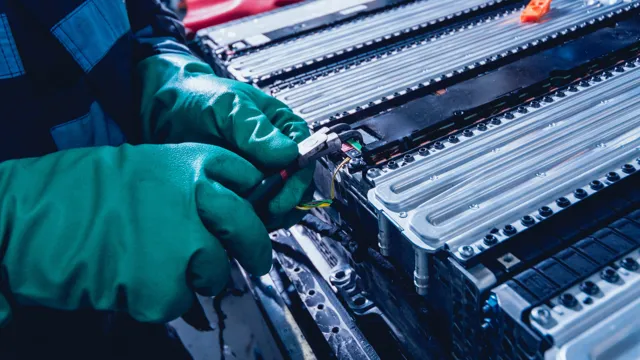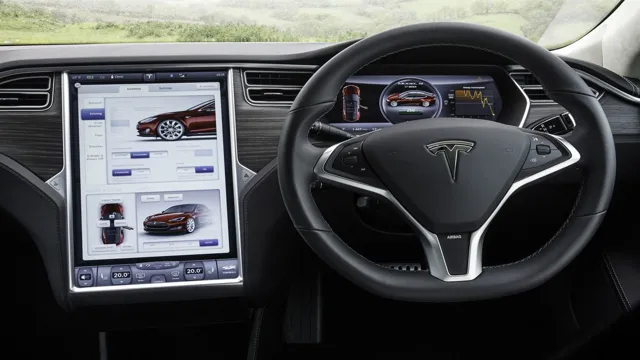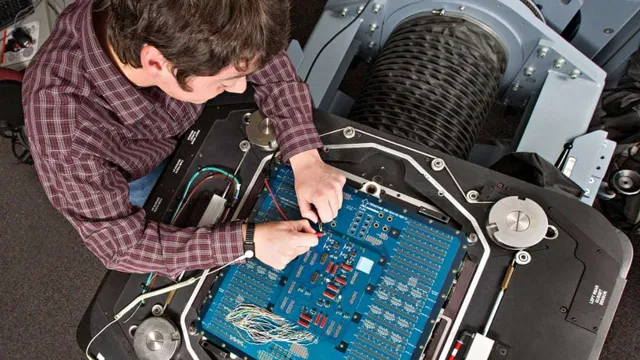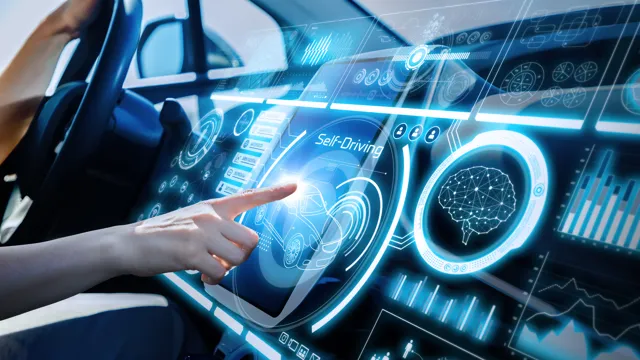Revolutionizing the Roads: Exploring the Futuristic Electric Car Battery Technology
As the world becomes increasingly conscious of its environmental impact, the demand for electric vehicles is growing at an unprecedented pace. However, the key to sustainable electric transportation lies in the technology powering the vehicles: the electric car battery. Currently, the lithium-ion battery dominates the market, but researchers and engineers are tirelessly working to develop the electric car battery tech of the future.
What advancements can we expect to see in this field in the coming years, and how will they impact the industry? From solid-state batteries to silicon-dominant anodes, the possibilities are endless. But what do these terms mean, and how will they revolutionize the performance and reliability of electric vehicles? In this blog post, we’ll explore the latest discoveries and innovations in electric car battery technology. We’ll cut through the jargon to provide a clear understanding of the exciting developments on the horizon.
Join us on this journey into the future of electric car battery tech and discover how it is paving the way towards a greener, more sustainable future.
Current Electric Car Battery Technology
When it comes to electric car battery technology of the future, the current technology has come a long way, but there is still much room for improvement. Lithium-ion batteries have become the industry standard due to their high energy density, long lifespan, and quick charging capability. However, these batteries are not without their drawbacks, such as being prone to overheating and requiring rare earth metals in their production.
Researchers are constantly working to improve battery technology, with potential breakthroughs including solid-state batteries that could provide even higher energy densities and longer lifespans. Additionally, the use of alternative materials such as sodium and magnesium could reduce the reliance on rare metals and make battery production more sustainable. With advancements in electric car battery technology, the future of transportation looks bright, with electric vehicles poised to become even more efficient, reliable, and accessible to the masses.
Lithium-Ion Batteries Dominate Market
When it comes to electric car batteries, lithium-ion technology currently dominates the market. These batteries are lightweight, long-lasting, and able to efficiently store and release energy. They are also relatively safe and do not produce harmful emissions, making them an ideal choice for electric vehicle manufacturers.
Despite the advantages of lithium-ion batteries, there are some potential issues to keep in mind. For example, they can be expensive to produce, and they can degrade over time if not properly maintained. Additionally, there are concerns about the environmental impact of lithium mining and disposal.
Nonetheless, many experts believe that lithium-ion technology will continue to play a major role in the future of electric cars. As the demand for electric vehicles grows, it is likely that advances in battery technology will continue to emerge, making these cars even more practical and efficient alternatives to traditional gas-powered vehicles.
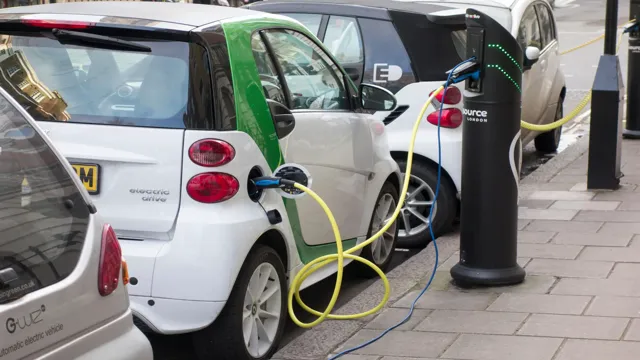
Drawbacks: Cost, Charge Time, Range
When it comes to electric cars, the cost, charge time, and range are major drawbacks for most drivers. While electric cars are becoming more affordable, the technology behind the batteries can still be pricey. Along with the purchase cost, long charging times of several hours can be frustrating for those who are used to quick refueling at gas stations.
Additionally, electric cars have a limited range compared to traditional gas-powered vehicles, which can limit their usefulness for longer trips. However, current battery technology is improving rapidly, and advancements in materials and charging infrastructure are helping to address these issues. As more people make the switch to electric cars, we can expect to see these drawbacks fade away over time.
New Battery Technology on the Horizon
Electric car battery technology is advancing at a rapid pace, and the future looks promising. Researchers are working on new battery technology that could make electric vehicles more efficient and cost-effective. One of the most promising developments is the use of solid-state batteries, which don’t require liquid or gel electrolytes to operate.
Solid-state batteries are lighter, safer, and have a higher energy density than traditional lithium-ion batteries. Another exciting development is the use of lithium-sulfur batteries, which could potentially double the range of electric vehicles. These batteries function using sulfur instead of cobalt, a rare and expensive material used in most batteries.
The shift towards renewable energy sources is playing a crucial role in driving innovation in battery technology. As more and more countries aim to reduce their carbon footprint, electric vehicles and their battery technology will become even more crucial in the coming years. With all these advancements, it’s clear that the electric car battery technology is constantly evolving, offering a bright and sustainable future.
Solid-State Batteries Offer Li-Ion Alternative
Solid-State Batteries With the limitations of traditional lithium-ion batteries becoming more apparent, researchers are looking for new solutions to power our electronic devices. Enter solid-state batteries – a promising alternative that uses a solid electrolyte instead of the liquid or gel electrolyte in traditional batteries. Solid-state batteries offer many benefits, including increased energy density, faster charging times, and a longer lifespan.
Additionally, these batteries are safer and more environmentally friendly than traditional batteries, as they don’t rely on flammable liquids or toxic heavy metals. While solid-state batteries are still in the early stages of development, they have the potential to revolutionize the way we power our devices in the future. It’s an exciting prospect for a greener and more efficient energy landscape.
Metal-Air Batteries Show Potential for Long-Range Driving
Metal-air batteries are a promising new technology that could revolutionize the way we think about long-range electric vehicles. Unlike traditional lithium-ion batteries, which have a limited range and can take hours to recharge, metal-air batteries use oxygen from the air as one of their key components, allowing them to store far more energy in a smaller space. This means that electric cars with metal-air batteries could travel farther on a single charge, potentially even rivaling the range of gas-powered vehicles.
The technology is still in its early stages, but researchers are optimistic about its potential for the future. With metal-air batteries, it may be possible to build electric cars that are both practical and sustainable, paving the way for a greener and more efficient transportation system.
Graphene-Based Batteries Could Revolutionize Charging Times
Graphene-based batteries are the latest buzz in battery technology. With their potential to revolutionize charging times, they are a hot topic in the tech world. Graphene is a thin layer of carbon with unique properties, which makes it an ideal material for batteries.
It is lightweight, durable, and can conduct electricity extremely well. The potential of graphene-based batteries is immense, as they can hold more energy than traditional batteries and charge much faster. In fact, it is believed that these batteries can charge up to 5 times faster than lithium-ion batteries.
This technology is still in its early stages, but the future seems promising for this new type of battery technology. With graphene-based batteries, the days of long charging times could soon be a thing of the past.
Challenges for Development and Adoption
The electric car battery technology of the future faces a number of challenges that must be tackled in order to ensure widespread adoption. One major hurdle is the issue of range anxiety, as many consumers worry about the distance they can drive before needing to recharge. Another challenge is the high cost of current battery technology, which makes electric vehicles more expensive than their gasoline counterparts.
In addition, there is a lack of infrastructure to support widespread adoption of electric vehicles, including charging stations and maintenance facilities. Moreover, the production of these batteries requires a significant amount of rare earth metals, which are expensive and not environmentally friendly to extract. To overcome these challenges, researchers are exploring new battery materials like solid-state batteries which have the potential to provide more range, faster charging times, and increased durability.
An electric car battery technology of the future will need to be both efficient and affordable in order to become a viable alternative to traditional combustion engine vehicles.
Cost, Scalability, and Safety Concerns
The development and adoption of smart cities face significant challenges when it comes to cost, scalability, and safety concerns. One of the main impediments to the creation of smart cities is the financial cost. The implementation of new technologies and infrastructure can be very expensive, and many cities may not have the necessary resources to fund these projects.
Additionally, the scalability of smart city technology has yet to be proven. As more people move into urban areas, the demand for smart city services will increase, and cities will need to have the infrastructure to meet this demand. However, it is unclear whether smart city technology is capable of scaling to meet the needs of a rapidly growing urban population.
Finally, safety concerns must be addressed. Smart city technology collects vast amounts of data, and there are concerns about how this data will be used and who will have access to it. There are also safety concerns related to cyber attacks and the potential for hackers to gain control of critical infrastructure.
As cities work to address these challenges, it will be important to balance the benefits of smart city technology with the potential risks and costs associated with its implementation.
Infrastructure Needs for Widespread Use
One of the biggest challenges for the development and adoption of widespread infrastructure is the sheer scale of the undertaking. The infrastructure required to support large-scale, widespread use of a technology or service can be massive and complex – think of the far-reaching network of roads and highways that enable the widespread use of automobiles, for example. Infrastructure needs for emerging technologies like electric vehicles or renewable energy may involve building new charging or storage facilities, creating new energy grids, and retrofitting existing buildings and transportation systems.
Financing and coordination can also pose significant hurdles, as multiple stakeholders may have different priorities and timelines. Despite these challenges, the benefits of investing in infrastructure can be enormous, both in terms of economic growth and environmental sustainability. As new technologies and services continue to emerge, it will be essential to address these infrastructure needs in order to enable their full potential.
Impacts on Sustainability and Energy Independence
The future of electric car battery technology is set to have a significant impact on sustainability and energy independence. With the current increase in demand for electric vehicles (EVs), it is crucial to develop high-performing batteries that are more efficient and cost-effective. These advancements in electric car battery technology will not only lead to the reduction of greenhouse gas emissions, but also to the transition to a more sustainable energy future.
The development of high-density and long-lasting batteries will go a long way in making the EVs practical for everyday use while also reducing the dependency on fossil fuels. Furthermore, the use of sustainable materials and recycling practices in battery manufacturing will have a positive impact on the environment and reduce the carbon footprint of the EVs. The electric car battery technology of the future will provide a sustainable and reliable means of transportation that will lead to a more energy independent and cleaner future.
Conclusion
In conclusion, the future of electric car battery technology is looking brighter than ever. With advancements in materials science, nanotechnology, and renewable energy sources, there’s no limit to what we can achieve. Electric cars will soon become the norm, replacing gas-guzzling vehicles with sleek and efficient machines that are kinder to the environment.
And who knows, maybe one day we’ll even have batteries that can charge themselves as we drive! So buckle up, because the electric car revolution is just beginning – and it’s going to be electrifying.”
FAQs
What is the current state of electric car battery technology?
Electric car battery technology is constantly evolving, with improvements being made to increase energy density and charging speed.
How long do electric car batteries typically last?
The lifespan of an electric car battery can vary, but they generally last between 8 to 10 years or around 100,000 miles before needing to be replaced.
Are there any new battery technologies on the horizon for electric cars?
Yes, there are several promising new battery technologies being developed such as solid-state batteries, which offer higher energy density and faster charging times.
How does electric car battery technology contribute to sustainable transportation?
Electric car battery technology enables vehicles to run on electricity rather than fossil fuels, reducing greenhouse gas emissions and air pollution. It also enables the use of renewable energy sources for charging, further reducing environmental impact.
